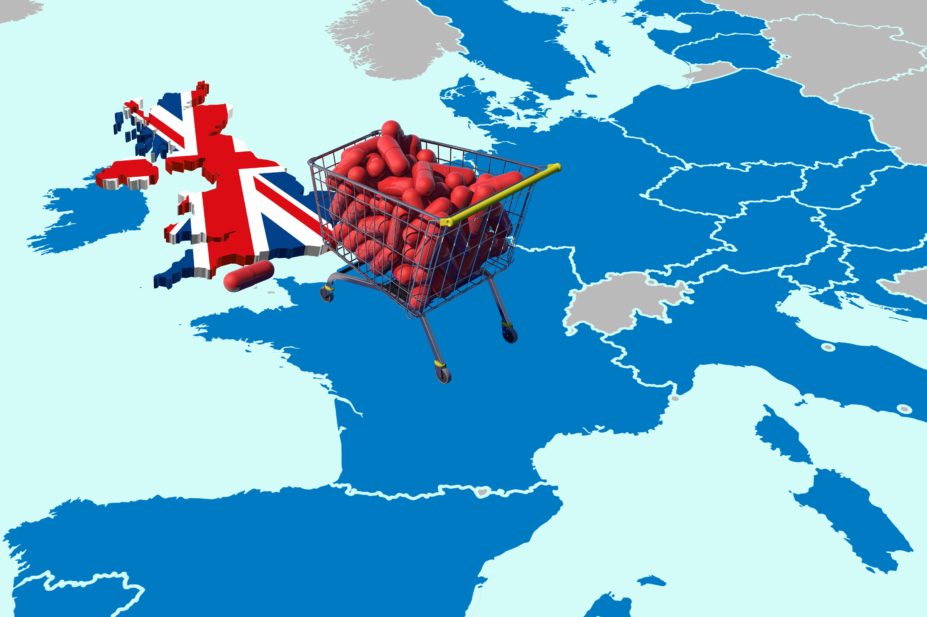
Mclean/Shutterstock.com
While the world has been distracted by the COVID-19 pandemic, the clock counting down the UK’s complete detachment from the EU continues to tick.
Negotiators from the EU and UK returned to face-to-face discussions at the end of June 2020, with prime minister Boris Johnson promising to “put a tiger in the tank” of talks just six months before the UK’s Brexit transition period ends (see Box).
But the UK government confirmed on 12 June 2020 that it will not seek to extend the Brexit transition period and it is already signalling that it is prepared to go it alone, even in crucial areas such as the UK’s voluntary absence from EU procurement schemes for personal protective equipment (PPE) and other supplies during the COVID-19 pandemic.
Indeed, the unexpected presence of a worldwide pandemic has made it very difficult to predict what will happen in the run-up to 31 December 2020 — the date that the Brexit transition period is due to end, and the busiest time of year for pharmacy (see Box).
Barring a no-deal outcome — the odds of which are rising — the two sides will have to find agreement on five difficult areas that will affect the day-to-day lives of pharmacists and patients across the UK.
Box: Brexit timeline
23 June 2016— UK votes to leave the EU in a referendum by 51.89% to 48.11%.
29 March 2017— Article 50 of the Treaty on European Union is invoked, starting the process of the UK leaving the EU.
19 June 2017— negotiations on details of Brexit begin.
14 November 2018— the draft withdrawal agreement is published.
15 January 2019— the House of Commons rejects the agreement by 432 votes to 202. This is the biggest government defeat in UK history.
29 March 2019— the first date set for Brexit.
12 April 2019 — Brexit is delayed.
24 July 2019— Boris Johnson becomes prime minister following a general election.
31 October 2019— Brexit is delayed.
20 December 2019— a bill to ratify a new withdrawal agreement is passed in the House of Commons.
31 January 2020— the UK leaves the EU and the transition period for the UK and EU to finalise a deal begins.
31 December 2020 — the transition period is due to end.
1. Maintaining EU medicines supplies
The UK medicines supply chain demonstrated its robustness during the pandemic, but whether it can withstand the triple pressures of winter, coronavirus and Brexit is causing some anxiety.
Around 70% of prescription medicines dispensed in the UK come through the EU at some point. As a result, drug manufacturers were asked by the UK government to maintain Brexit stockpiles after the UK left the EU as a precaution against COVID-19-related shortages.
These have played a vital role in managing the pandemic, but a pharmaceutical industry memo, reported by the BBC in June 2020, said the UK government had been advised to build its own stockpiles of some “critical” COVID-19 drugs because existing supplies had been used up and it would not be possible to rebuild the stockpiles in case of a no-deal Brexit.
Warwick Smith, director general of the British Generic Manufacturers Association, says disruption across the English Channel owing to new customs and border controls is the main issue. “Most medicines imported into the UK come via this route, and it is vital that manufacturers and hauliers are made aware of the new procedures as soon as possible and that they are fully prepared.”
He adds that the pandemic has depleted stocks, global supplies have been disrupted and “it will simply not be possible to repeat the creation of additional stockpiles for all medicines, though we may be able to do so for some.”
This all comes with the risk that prices will rise, adds Leyla Hannbeck, chief executive of the Association of Independent Multiple Pharmacies. “We don’t want our members in a situation where they are out of pocket or spending a lot of time trying to source medicines.”
She called for clarification as soon as possible on whether pharmacists would be required to pay back the £370m loan they have been given to help manage coronavirus pressures. “If they have to pay it back, I don’t know how they are going to survive and manage Brexit on top of that.”
Helga Mangion, policy director at the National Pharmacy Association, says “one sensible precautionary step” would be to allow pharmacies to share medicines with each other in the event of shortages. “This flexibility was available to pharmacies until a few years ago and it should now be reintroduced.”
2. Arrangements for licensing and regulation of medicines
Closely linked to medicines supply is the regulation and licensing of drugs. Until the end of 2020, EU pharmaceutical law will continue to apply in the UK and negotiations are ongoing on the future relationship between the European regulator and the Medicines and Healthcare products Regulatory Agency (MHRA).
The European Medicines Agency (EMA) left London and relocated to Amsterdam in March 2019 and, in preparation for Brexit, the UK’s portfolio of medicines was redistributed to other EU member states, which involved transferring more than 370 authorised products to rapporteurs from the EU27 countries, plus Iceland and Norway.
The then health and business secretaries, Jeremy Hunt and Greg Clark, wrote to the Financial Times in 2017 stating their wish for a “special relationship” with the EMA after Brexit. And Martin Sawer, executive director of the Healthcare Distribution Association (HDA), which represents wholesalers, stresses that the HDA would like to see the MHRA “re-confirm publicly” that it will unilaterally recognise EU medicines regulations after the UK leaves the EU.
“Medicines supply from EU to UK is not about tariffs, but regulations,” he adds. “Any regulatory variations from 1 January 2021 in the UK’s regulatory acceptance of EU medicines will immediately create supply shocks,” he adds.
The Medicines and Medical Devices Bill which, among other things, puts EU directives into domestic law addressing any regulatory gaps that may appear when the UK leaves the EU, is still wending its way though the House of Commons.
“Everything has been put on hold because of the pandemic, so we’re still working out how the MHRA is going to operate,” Sawer adds.
We need to know what the government’s plans are with regards to the Falsified Medicines Directive
Another aspect of EU legislation that may cause pharmacists some concern is the Falsified Medicines Directive (FMD), which was introduced to reduce the number of counterfeit medicines entering the supply chain.
The MHRA has said that the FMD will cease to apply in the UK if there is a no-deal Brexit, because UK pharmacies will no longer have access to the database that holds FMD information, but it is not clear what would replace the system in this case. The MHRA has indicated it would consider setting up a UK version of the FMD in case of leaving the EU without a deal.
“We are concerned about the impact on our members’ operations as our access to the EU’s FMD system is switched off,” says Harrison. “Since February 2019, pharmacies have invested heavily to enable them to comply.”
Hannbeck says her members also want clarification. “We need to know what the government’s plans are with regards to FMD and what pharmacists need to do from 2021, and we need to be able to prepare.”
3. Pharmacists’ rights to work in the EU
The UK government introduced legislation so that the EU directive which meant that UK qualifications, including those in pharmacy, were recognised across the EU — and vice versa — would still apply in case of a no-deal Brexit. But that has now been superseded and the subject will be part of the UK–EU negotiations.
We do have worries about recruitment and how this is going to be impacted by Brexit
Paul Day, director of the Pharmacists’ Defence Association, is worried about the possibility of pharmacists with UK-only citizenship being unable to work as pharmacists across the rest of the EU.
“This is potentially bad news for community pharmacists already short of staff,” agrees Hannbeck. “We do have worries about recruitment and how this is going to be impacted by Brexit.”
On 13 July 2020 the UK government announced that pharmacists from outside the UK would be included in a new fast-track ‘health and care visa’ system, which will feature reduced fees and dedicated support teams, if they apply to live and work in the UK after the 1 January 2021. Those applying must have a job offer from the NHS or from “employers and organisations which provide services to the NHS”.
4. Support for research and universities
The life sciences industry, universities and NHS clinical trials are all closely interlinked and now face the prospect of being hit by first coronavirus and then Brexit.
The UK government has said it will underwrite some EU-awarded funding grants, such as the Horizon 2020 programme, but only until the end of 2020. In England and Wales, the governments have said that EU students’ fee structure will remain the same for those starting their course in 2020/2021 and, in Scotland, the government has said EU students will qualify for free tuition if they begin a course in 2020/2021. But this will change from the following academic year.
Coronavirus has hit the UK higher education sector particularly hard, with many students expected to delay their studies until the uncertainty over the pandemic recedes. It also relies heavily on money from foreign students and so the continuation, or otherwise, of the Erasmus exchange programme will be a major concern post-Brexit.
The government needs to have a sound strategy for higher education and adequately fund the sector
“There are potential negative consequences for the funding and resources of the higher education sector, which will impact on pharmacy schools and their students,” says Day.
“The government needs to have a sound strategy for higher education and adequately fund the sector,” he adds.
Gino Martini, chief pharmacist at the Royal Pharmaceutical Society, cites the dire situation facing universities as his “biggest concern” around Brexit, which has the potential to hit both teaching and research. “We imagine a lot of students are going to defer and this is a really big issue because universities are the research engine. They drive life sciences research and drive applied skills graduates coming into the workforce.”
He adds: “It is critically important that universities are protected.”
5. Timing of the end of the transition period
One of the chief concerns at the top of everyone’s lists should be timing, says Martini . “Restarting negotiations again after a three-month pandemic concerns me a bit because everything has been on hold. I am a bit perplexed that they are being rammed through at the end of the year.”
In addition, COVID-19 has added an extra dimension that has made it very difficult to predict what will happen in the run up to 31 December — already the busiest time of year for pharmacy.
Martin Sawer explains that the whole sector needs “a bit of breathing space”, particularly with possible future COVID-19 spikes; expected plans for a broader flu vaccination programme; possible new coronavirus treatments and vaccinations; and the “uneven” demands of an NHS trying to get back to some sort of business as usual.
“In the secondary care sector specifically, demands for some medicines exceeded all existing pandemic planning scenarios, while other medicines have been very under-prescribed over the last few months — so future demand patterns are really difficult for manufacturers and wholesalers to predict at the current time,” he says.
- This article was updated on 17 July 2020 to reflect that the MHRA has indicated it would consider setting up a UK version of the FMD in case of leaving the EU without a deal.


